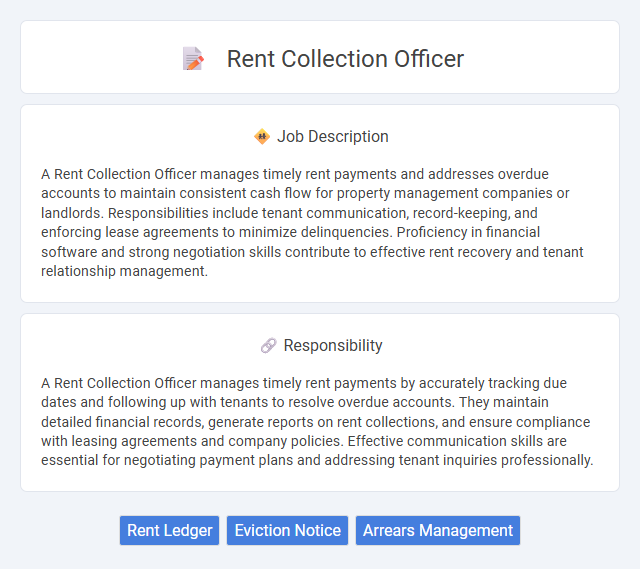
A Rent Collection Officer manages timely rent payments and addresses overdue accounts to maintain consistent cash flow for property management companies or landlords. Responsibilities include tenant communication, record-keeping, and enforcing lease agreements to minimize delinquencies. Proficiency in financial software and strong negotiation skills contribute to effective rent recovery and tenant relationship management.
Individuals with strong organizational skills and attention to detail are likely to thrive as rent collection officers, as the role demands precise record-keeping and consistent communication with tenants. Those who handle stress well and possess effective negotiation abilities may find it easier to resolve conflicts and ensure timely payments. People who struggle with confrontation or time management might find this job challenging and less suitable for their strengths.
Qualification
Rent collection officers typically require a high school diploma or equivalent; however, candidates with a background in finance, business administration, or property management are highly preferred. Proficiency in accounting software, strong communication skills, and experience in debt collection or customer service enhance qualification success. Certifications related to property management or credit counseling provide a significant advantage for career advancement.
Responsibility
A Rent Collection Officer manages timely rent payments by accurately tracking due dates and following up with tenants to resolve overdue accounts. They maintain detailed financial records, generate reports on rent collections, and ensure compliance with leasing agreements and company policies. Effective communication skills are essential for negotiating payment plans and addressing tenant inquiries professionally.
Benefit
Rent collection officers likely benefit from consistent monthly income through commissions or bonuses tied to successful rent recovery, promoting financial stability. They may experience skill development in negotiation and conflict resolution, enhancing career growth prospects. Opportunities for flexible work schedules could increase job satisfaction and work-life balance.
Challenge
Rent collection officers probably face challenges related to balancing empathetic communication with tenants while enforcing timely payments. The role likely demands strong negotiation skills to address disputes and prevent lease violations. Managing diverse tenant situations and maintaining accurate financial records adds complexity to daily responsibilities.
Career Advancement
Rent collection officers play a crucial role in managing tenant payments and ensuring consistent cash flow for property management companies, serving as a stepping stone for careers in real estate and finance. Mastery in rent collection processes and tenant communication can lead to promotions such as leasing consultant, property manager, or accounts receivable specialist. Gaining experience in financial software and legal compliance enhances opportunities for advancement into supervisory or administrative positions within property management firms.
Key Terms
Rent Ledger
A Rent Collection Officer is responsible for maintaining accurate and up-to-date rent ledgers to track tenant payments and outstanding balances. They ensure all rent entries are recorded timely, resolving discrepancies to support efficient financial management and reporting. Expertise in rent ledger management enhances cash flow monitoring and tenant account reconciliation.
Eviction Notice
A Rent Collection Officer is responsible for issuing Eviction Notices to tenants who fail to meet rental payment deadlines, ensuring compliance with local housing laws. Timely distribution of these notices is critical to initiating the legal eviction process and maintaining property revenue. This role requires strong knowledge of eviction regulations and effective communication skills to handle tenant disputes professionally.
Arrears Management
A Rent Collection Officer specializing in arrears management is responsible for monitoring overdue rent payments, initiating timely reminders, and negotiating payment plans to reduce rental debt. Effective arrears management involves maintaining accurate records, analyzing payment patterns, and collaborating with tenants to resolve outstanding balances while minimizing financial risks to the property owner. Proficiency in debt recovery protocols and strong communication skills are essential for successful rent arrears recovery and maintaining positive tenant relationships.
 kuljobs.com
kuljobs.com